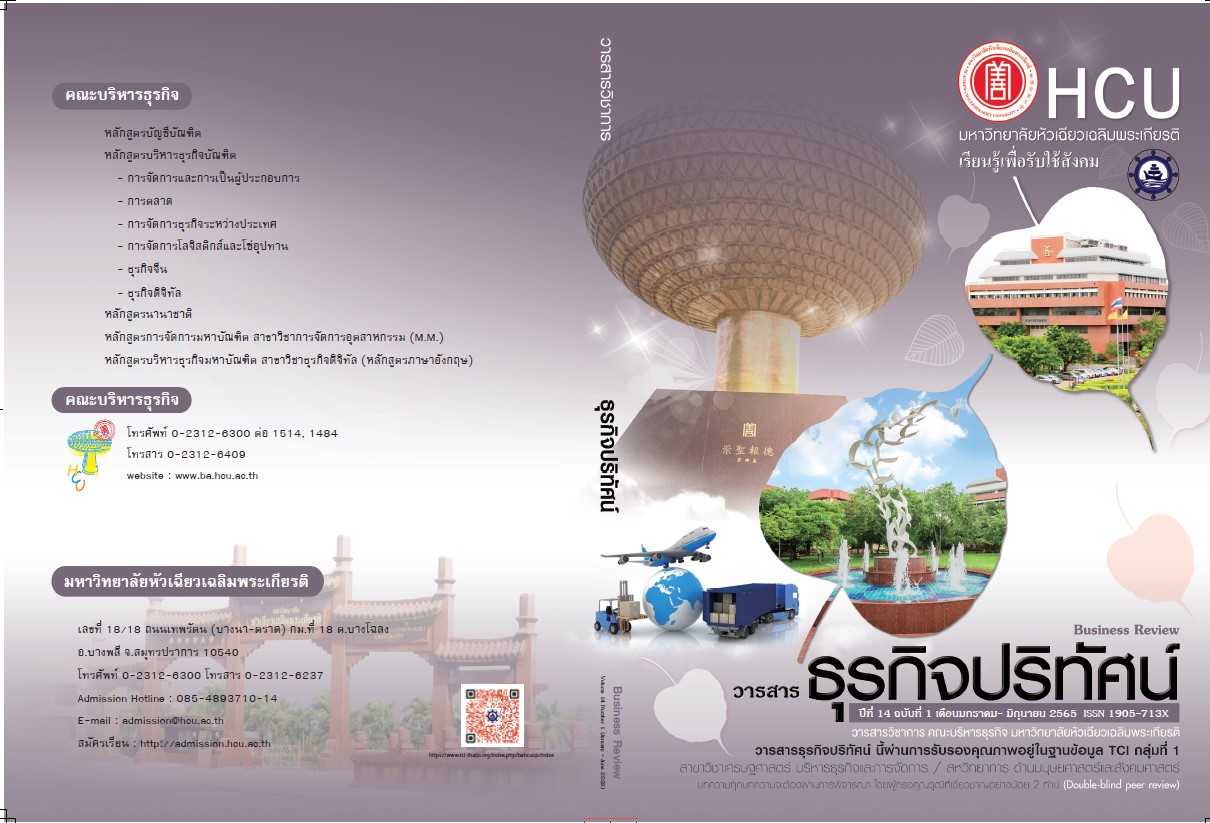The Component of Long-Term Relationships Between Buyers and Suppliers of Information Technology Systems Business in Thailand
Keywords:
Long-Term Relationship Component, Information Systems Success Model, Information System, Buyer, SupplierAbstract
The objective of this research is to clarify the concept of long-term relationship in the IT service business and to validate and confirm he component of Long-Term Relationships Between buyers and suppliers of information technology systems business in Thailand which integrated from information systems success model and impregnable exchange relationship model by using the qualitative research from 12 key informants. The research tool consists of semi-structured questions and an online system for interviews and data analysis with content analysis. The results show that the definition of long-term buyer – seller relationship of information technology systems must be arisen from integrity, trust and commitment to responsibility, preparation and dedication in organizational development, flexibility and timely problem solving. Then the integrative model is consistent to explain the long-term buyer – seller relationships information technology systems in Thailand.
References
Buttle, F. (2009). Customer Relationship Management: Concepts and Technologies. Oxford: Elsevier.
Clauss, T., & Tangpong, C. (2018). In search for impregnable exchange relationships with buyers: Exploratory insights for suppliers. Industrial Marketing Management, 75, 1–16.
De Ruyter, K., Keeling, D. I., & Cox, D. (2019). Customer-supplier relationships in high technology markets 3.0. Industrial Marketing Management, 79, 94-101.
DeLone, W. H., & McLean, E. R. (2003). The DeLone and McLean model of information systems success: A ten-year update. Journal of Management Information Systems, 19(4), 9–30.
Griffith, D. A., & Zhao, Y. (2015). Contract specificity, contract violation, and relationship performance in international buyer- supplier relationships. Journal of International Marketing, 23(3), 22–40.
Miles, M. B., & Huberman, A. M. (1994). Qualitative Data Analysis: An Expanded Sourcebook (2nd ed.). Thousand Oaks, CA: Sage.
Monk, E., & Wagner, B. (2006). Concepts In Enterprise Resource Planning. Boston. MA: Thomson.
Pasunon, P. (2015). Operational problems of agricultural cooperratives in Thailand: A grounded theory developed from government officials in cooperative promotion department and cooperative auditing department. Srinakharinwirot Research and Development (Journal of Humanities and Social Sciences), 7(1), 85-101.
Tangwannawit, S. (2012). Strategic information systems and information systems development. Information Technology Journal, 8(2), 56-63.
Urbach, N., & Müller, B. (2012). The updated DeLone and McLean model of information systems success. In Y. K. Dwivedi, M. R. Wade, & S. L. Schneberger (Eds.). Information Systems Theory: Explaining and Predicting Our Digital Society, 1, 1–18.
Van de Vijver, M., Vos, B., & Akkermans, H. (2011). A tale of two partnerships: Socialization in the development of buyer-supplier relationships. Journal of Supply Chain Management, 47(4), 23–41.
Whipple, J. M., & Roh, J. (2010). Agency theory and quality fade in buyer-supplier relationships. International Journal of Logistics Management, 21(3), 338–352.
Yang, J., Wong, C. W. Y., Lai, K. -H., & Ntoko, A. N. (2009). The antecedents of dyadic quality performance and its effect on buyer-supplier relationship improvement. International Journal of Production Economics, 120, 243–251.
Downloads
Published
How to Cite
Issue
Section
License
Copyright (c) 2022 Business Review Journal

This work is licensed under a Creative Commons Attribution-NonCommercial-NoDerivatives 4.0 International License.
All articles published in the Business Administration and Management Journal Review are copyrighted by the journal.
The views and opinions expressed in each article are solely those of the individual authors and do not represent those of Huachiew Chalermprakiet University or any other faculty members. Each author is fully responsible for the content of their own article. Any errors or issues found are the sole responsibility of the respective author.




